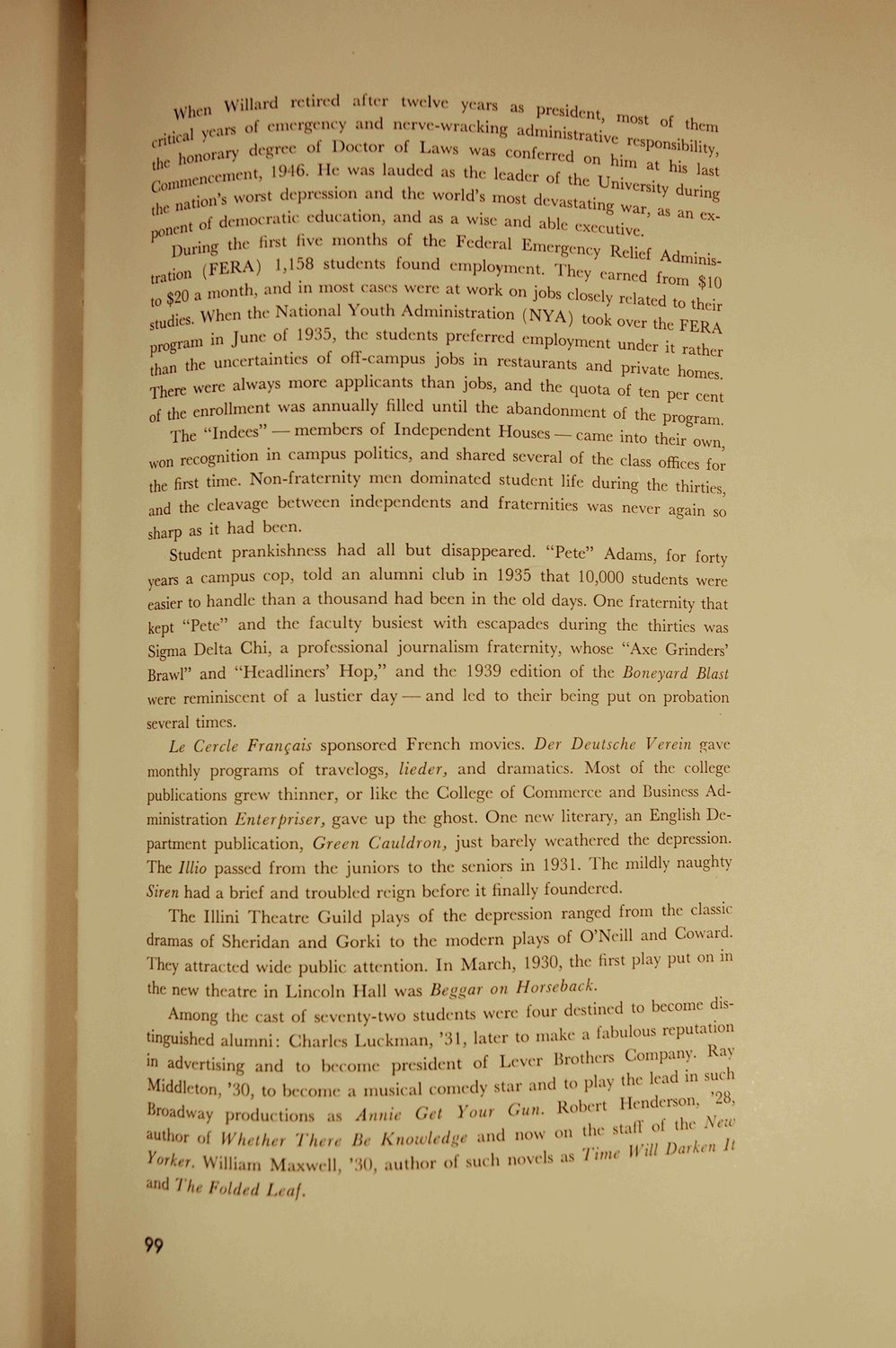| |
| |
Caption: Book - Illini Years
This is a reduced-resolution page image for fast online browsing.

EXTRACTED TEXT FROM PAGE:
Willard retired afte, twelve years as p r c s i d , V ( , u s of emergency and nerve-wracking administrative "'"' rC8ponsibi f ^ J r a r y degree of Doctor of Laws was conferred T l %. , ; ; „ „ , , , „ , „ - . 1M«. He was lauded as the leader of the v Z l ^ * g „, nation's worst depression and the world's most devastating W a " an L e n t « f democratic education, and as a wis,, and a b l e e x e c u t i v e ' > * P During the Inst five months of tin- Federal Emergency Relief AH • • 1,158 students found employment. They earned ^ 0 (FERA) $2 0 a month, and in most cases were at work on jobs closely related to th • studk-s. Winn the National \ outh Administration (NYA) took over the FERA rogr a.n in June of 1935, the students preferred employment under it rather than the uncertainties of off-campus jobs in restaurants and private homes There were always more applicants than jobs, and the quota of ten per cent 0f the enrollment was annually filled until the abandonment of the program The "Indees" — members of Independent Houses —came into their own won recognition in campus politics, and shared several of the class offices for the first time. Non-fraternity men dominated student life during the thirties, and the cleavage between independents and fraternities was never again so sharp as it had been. whcn Student prankishness had all but disappeared. "Pete" Adams, for forty years a campus cop, told an alumni club in 1935 that 10,000 students were easier to handle than a thousand had been in the old days. One fraternity that kept "Pete" and the faculty busiest with escapades during the thirties was Si<nna Delta Chi, a professional journalism fraternity, whose "Axe Grinders' Brawl" and "Headliners' Hop," and the 1939 edition of the Boneyard Blast were reminiseent of a lustier day — and led to their being put on probation * several times. Le Cercle Francais sponsored French movies. Der Deutsche Verein gave monthly programs of travelogs, lieder, and dramatics. Most of the college publications grew thinner, or like the College of Commerce and Business Administration Enterpriser, gave up the ghost. One new literary, an English Department publication, Green Cauldron, just barely weathered the depression. The lllio passed from the juniors to the seniors in 1931. The mildly naughty Siren had a brief and troubled reign before it finally foundered. The Illini Theatre Guild plays of the depression ranged from the classic dramas of Sheridan and Gorki to the modern plays of O'Neill and Coward. They attracted wide public attention. In March, 1930, the fust play put on in the new theatre in Lincoln Hall was Beggar on Horseback. Among the cast of sevcnty-tWO students were lour destined to become distinguished alumni: Charles Luckman, '31, later to make a fabulous reputation in advertising and to become president of Lever brothers Company, taj Middleton, '30, to become a musical comedy star and to play the leadjn suc^ Broadway productions as Annie Get Youi Gun. Robert Hen e*om ^ o . authoi ol Whether Then Be Knowledge and now en the staft o ^ Y "kert William Maxwell, '30, author of such novels as Time W\ *&Thi Folded Leaf. 99
| |